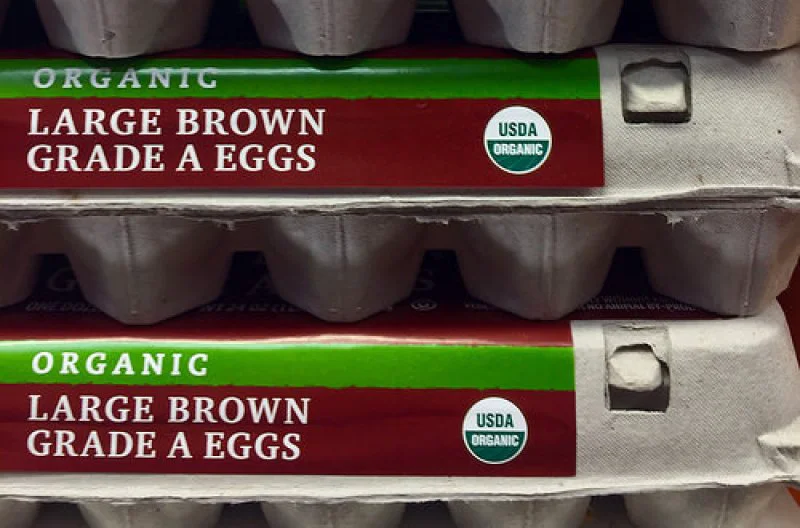Viewpoint: How organic proponents hijacked the term ‘organic’ and why confused consumers are the victims
Viewpoint: How organic proponents hijacked the term ‘organic’ and why confused consumers are the victims


I recently learned that Costco is selling “organic protein.” My first reaction was to laugh, because all protein is organic and there’s no such thing as inorganic protein. But I laughed too soon. It seems advocates of organic food have hijacked the word “organic.” They have taken what was once a very precise term in chemistry and have perverted it to serve their ideological agenda.
“Organic” was originally used in chemistry to denote the class of carbon-based compounds found in plants or animals. The opposite of organic (its antonym) is “inorganic”.
Today it has an additional definition: any food that is produced using approved methods of organic farming. To be certified as organic, a product must meet strict USDA standards related to pesticide, fertilizer, and hormone use, soil quality and animal raising practices. Note that this is not a precise definition since it varies from country to country and over time as the required standards change.
…
There’s no evidence that organic food is more nutritious or safer or better for health. People who eat organic foods claim that they taste better, but in blinded taste tests they may not be able to tell the difference, or they may say the conventional food tastes better. And the benefits to the environment remain controversial. With organic farming practices, the yield typically goes down and the price goes up.
…
Words matter. The misuse of the word “organic” has only served to confuse people. Its original meaning in chemistry is clear; its antonym is “inorganic”.
I wish Costco would stop calling their product “organic protein”. It would be more precise to call it “protein produced in accordance with current regulations for organic farming”.
Meanwhile, I will continue to laugh when I see advertising for “organic” meat, eggs, dairy, protein, or other foods that couldn’t possibly be inorganic. Maybe I should cry, but it’s more fun to laugh as I try to imagine an inorganic cow.
This is an excerpt. Read the original post here.

 | Videos | More... |

Video: Nuclear energy will destroy us? Global warming is an existential threat? Chemicals are massacring bees? Donate to the Green Industrial Complex!
 | Bees & Pollinators | More... |

GLP podcast: Science journalism is a mess. Here’s how to fix it

Mosquito massacre: Can we safely tackle malaria with a CRISPR gene drive?

Are we facing an ‘Insect Apocalypse’ caused by ‘intensive, industrial’ farming and agricultural chemicals? The media say yes; Science says ‘no’
 | Infographics | More... |

Infographic: Global regulatory and health research agencies on whether glyphosate causes cancer
 | GMO FAQs | More... |

Why is there controversy over GMO foods but not GMO drugs?

How are GMOs labeled around the world?

How does genetic engineering differ from conventional breeding?
 | GLP Profiles | More... |

Alex Jones: Right-wing conspiracy theorist stokes fear of GMOs, pesticides to sell ‘health supplements’




 Viewpoint — Fact checking MAHA mythmakers: How wellness influencers and RFK, Jr. undermine American science and health
Viewpoint — Fact checking MAHA mythmakers: How wellness influencers and RFK, Jr. undermine American science and health Viewpoint: Video — Big Solar is gobbling up productive agricultural land and hurting farmers yet providing little energy or sustainabilty gains
Viewpoint: Video — Big Solar is gobbling up productive agricultural land and hurting farmers yet providing little energy or sustainabilty gains Trust issues: What happens when therapists use ChatGPT?
Trust issues: What happens when therapists use ChatGPT? Fighting deforestation with CO2: Biotechnology breakthrough creates sustainable palm oil alternative for cosmetics
Fighting deforestation with CO2: Biotechnology breakthrough creates sustainable palm oil alternative for cosmetics California, Washington, Oregon forge immunization alliance to safeguard vaccine access against federal undermining
California, Washington, Oregon forge immunization alliance to safeguard vaccine access against federal undermining 30-year-old tomato line shows genetic resistance to devastating virus
30-year-old tomato line shows genetic resistance to devastating virus The free-range chicken dilemma: Better for birds, but with substantial costs
The free-range chicken dilemma: Better for birds, but with substantial costs ‘You have to treat the brain first’: Rethinking chronic pain with Sanjay Gupta
‘You have to treat the brain first’: Rethinking chronic pain with Sanjay Gupta
